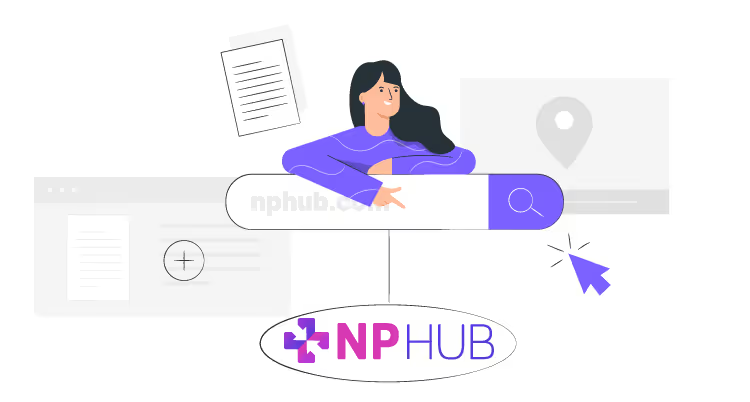Nurse Practitioner (NP) education is a pivotal advancement in nursing, allowing Registered Nurses to expand their scope and provide advanced care. At the heart of this educational journey lies a critical component: clinical rotations. NP clinicals are hands-on experiences that are a requirement for graduation and form the cornerstone of transforming nursing knowledge and research into practical, patient-centered care.
Becoming an NP is rigorous. As a nurse practitioner student, you’re subject to intensive coursework, hours of study, and the crucial step of applying theoretical knowledge in real-world settings. Clinical rotations bridge classroom learning with practice.
Also known as NP clinicals or preceptorships, these rotations allow nurse practitioner students to work with experienced NPs and physicians in various settings, honing skills, gaining confidence, and of course developing clinical judgment for advanced practice.
However, securing these vital experiences is often challenging. Nurse practitioner students face limited clinical sites, a shortage of preceptors, and sometimes inadequate program support. Finding the first clinical site and right preceptor can be stressful and time-consuming, often competing with coursework, personal commitments, and ongoing work.
In this guide, we'll explore the importance of clinical rotations in NP education, challenges in securing placements, and potential solutions to ensure the next generation of NPs receives the high-quality experiences they need to excel.
Whether you're a current nurse practitioner student struggling to find clinical sites, an aspiring NP, or an educator, this article offers insights and practical tips for navigating NP clinical rotations.
Understanding NP Clinical Rotations

Definition of Clinical Placements
Clinical placements, or clinical rotations, are a fundamental component of nurse practitioner education. These experiences can be defined as structured arrangements where NP students are present in healthcare environments for educational purposes. These settings provide services to patients and the public, including primary care facilities, specialty clinics, hospitals, and community health centers. During these rotations, students actively engage in patient care as part of a healthcare team, applying their knowledge in real-world scenarios.
Role of Preceptors in NP Education
Preceptors play a crucial role in the clinical education of NP students. These experienced professionals, often NPs or physicians, serve as mentors, guides, and evaluators throughout the clinical rotation. Preceptors are well-versed in their specialties and provide students with opportunities to:
- Observe and participate in patient care
- Develop clinical skills and judgment
- Learn about practice management and professional conduct
- Receive feedback on their performance and areas for improvement
The relationship between a NP student and their preceptor is vital for a successful clinical experience, fostering growth, confidence, and competence in future nurse practitioners.
Types of Clinical Rotations for NPs
Nurse practitioner students typically complete various clinical rotations to gain a well-rounded education. These may include:
- Primary Care: Often the cornerstone of NP education, especially for family nurse practitioners, focusing on general health maintenance and disease prevention.
- Specialty Rotations: These can include pediatrics, women's health, geriatrics, mental health, and acute care, among others.
- Chronic Disease Management: NP clinicals focused on managing long-term conditions such as diabetes, hypertension, or COPD.
- Urgent Care/Emergency Medicine: Providing experience in fast-paced, acute care settings.
- Community Health: Rotations in public health clinics or community-based organizations.
Each rotation type offers unique learning opportunities, helping students develop a diverse skill set and prepare for the various patient populations they may encounter in their future careers. The combination of these experiences ensures that nurse practitioners are well-prepared to provide comprehensive, patient-centered care across various healthcare settings upon graduation.
The Critical Importance of NP Clinicals

Clinical rotations are a crucial part of nurse practitioner education, bridging the gap between theoretical knowledge and practical patient care. These hands-on experiences are crucial for NP students to develop essential clinical skills, build professional networks, and prepare for certification exams. Through clinical rotations, future nurse practitioners gain the confidence and competence to provide high-quality care in various healthcare settings.
Key benefits of clinical rotations include:
- Application of classroom learning to real-world patient scenarios
- Development of diagnostic and treatment skills under experienced preceptors
- Exposure to diverse patient populations and healthcare environments
- Networking opportunities with potential colleagues and employers
- Enhanced preparation for certification exams through practical experience
- Increased confidence in clinical decision-making and patient management
The Current Landscape: Challenges in Securing NP Clinical Rotations

The Preceptor Shortage Crisis
The shortage of clinical preceptors is a critical issue in NP education. Many experienced nurse practitioners and physicians are hesitant to take on the role due to time constraints, concerns about reduced productivity, and a lack of incentives. This shortage directly impacts the quality and availability of clinical experiences for NP students.
The Burden on NP Students
Self-securing rotations has become a significant challenge for many students. This process is time-consuming and stressful, competing with coursework, personal commitments, and full-time work responsibilities. Many students spend months searching for suitable clinical sites and preceptors, often with limited success.
Lack of Support from NP Programs
While some NP programs and universities offer assistance in securing clinical placements, many schools struggle to provide adequate support, especially for out-of-state students. Limited resources, insufficient networking opportunities, and challenges in vetting distant preceptors contribute to this issue. The regulatory and licensing complexities across states further complicate the process for programs trying to assist students in securing clinical rotations outside their home state.
Financial Implications of Delayed Clinicals
The financial impact of delayed clinical rotations can be substantial for NP students. Each semester delay can result in additional school-related expenses of around $3,467 based on average tuition costs. Moreover, postponing graduation means missing out on the increased earning potential of an NP salary. A one-semester delay at your NP program or university could result in approximately $13,333 in lost wages. When factoring in additional tuition, lost wages, and accrued interest on student loans, the total financial impact of a single semester delay can reach nearly $17,000.
Additional Struggles Nurse Practitioner Students Face
NP students also contend with geographic limitations, often traveling long distances to attend, or relocating temporarily for clinical placements. Competition for available placements is fierce, particularly in popular specialties or desirable locations. Quality control is another concern, as students strive to ensure their clinical experiences provide the necessary skills and knowledge for their future practice. While most preceptors are great at their job, they aren’t always the best mentors.
The Role of Clinical Placement Agencies
In response to the challenges nurse practitioner students face in securing clinical rotations, clinical placement agencies have emerged as a valuable resource.
Clinical placement agencies are specialized services that help NP students secure their required clinical rotations. These agencies act as intermediaries between NP students and preceptors, offering a streamlined solution to the often challenging process of finding and securing clinical experiences. Their services typically include access to a network of vetted preceptors, student-preceptor matching, paperwork assistance, and ongoing support throughout the clinical rotation process.
By leveraging these agencies, NP students can save time, reduce stress, and increase their chances of completing their clinical requirements on schedule, whether they need help securing their first clinical rotation or their fourth.
Benefits of Using a Placement Agency
- Access to a wider network: Placement agencies often have extensive networks of preceptors across various specialties and locations, increasing the chances of finding suitable clinical matches.
- Quality assurance: Reputable agencies vet their preceptors, ensuring students are paired with experienced and qualified mentors.
- Streamlined process: Agencies handle much of the paperwork and logistics beyond the initial rotation request, simplifying the often complex process of securing clinical rotations and NP clinicals while also getting university approval.
- Increased likelihood of on-time graduation: By efficiently securing placements, preceptor matching services can help students avoid delays in completing their clinical hours with their university.
The Financial Dilemma for NP Students
NP students often face a challenge when securing clinical rotations. Despite paying high tuition fees, many programs offer limited help finding preceptors, leading students to turn to clinical placement agencies, which come with added costs.
Many nurse practitioner students feel that paying extra for preceptorships is unfair. They believe clinical placements should be included in tuition. The added expense of paying for a clinical preceptor compounds other educational costs like tuition, textbooks, and living expenses.
While paying for placement services poses a financial dilemma, students should carefully weigh the short-term costs against the long-term benefits. Researching options, understanding agency services, and evaluating personal circumstances can help ensure the decision aligns with educational and career goals.
NPHub: A Solution for NP Clinical Rotations

NPHub has established itself as America's leading preceptor-matching service for nurse practitioner students seeking clinical rotations. Since 2017, NPHub has successfully bridged the gap between NP students and quality clinical experiences, addressing common challenges in the placement process.
Key features and benefits of NPHub include:
- Over 10,000 successful clinical placements
- Network of 2,000+ active preceptors and clinical sites across 10 specialties
- Streamlined placement process, finding matches in minutes
- Comprehensive paperwork support through all stages of the paperwork process
- Quality assurance with a perfect preceptor match guarantee or full refund
- Flexible payment plans starting at $12.75/hour with only a 15% deposit
- Dedicated student coordinators providing ongoing support
NPHub's approach significantly reduces the time and stress of securing clinical rotations. NPHub allows nurse practitioner students to focus on their studies and advance their clinical preparation by managing the entire process from initial matching to paperwork completion.
The service's effectiveness is reflected in its stellar reputation:
- 4.9/5 star rating from 1,171 Google Reviews
- Over 8,000 nurse practitioner students placed
Conclusion
While the challenges of securing quality placements are significant—from preceptor shortages to financial burdens—solutions exist to support NP students in every point of their clinical journey.
NPHub stands at the forefront of these solutions, offering a complete and comprehensive approach to securing clinical rotations for nurse practitioner students. With over 10,000 successful placements and a network of 2,000+ active preceptors, we've helped thousands of NP students overcome common obstacles and progress towards graduation.
Don't let the stress of finding clinical placements and NP clinicals hinder your path to becoming a skilled nurse practitioner. Take the next step in your NP journey with NPHub:
- Visit nphub.com to explore our services
- Book a free consultation to discuss your clinical rotation needs
- Join over 8,000 satisfied NP students who've completed more than 10,000 rotations with NPHub and accelerated their path to graduation
Explore our available preceptors today and transform your clinical rotation experience from a challenge into an opportunity for growth and success.
Find a preceptor who cares with NPHub
Book a rotation.webp)








.webp)


.webp)



.webp)